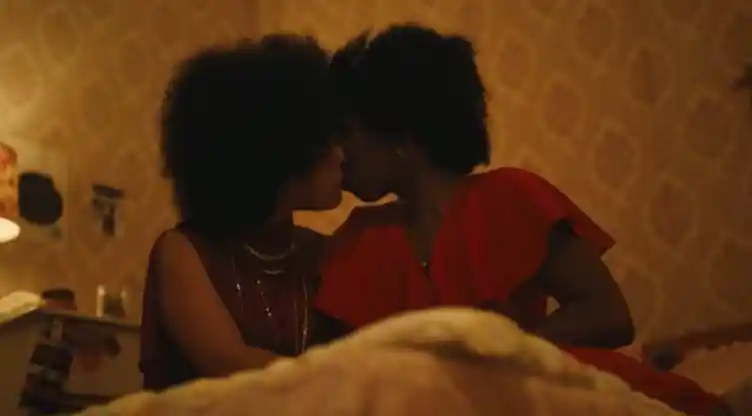Steve McQueen’s Small Axe thrills queer Black viewers with much-needed representation in Lovers Rock

Lovers Rock is the second film in the Small Axe series. (BBC)
Lovers Rock, the second instalment in Steve McQueen’s Small Axe series, thrilled queer Black viewers with a stolen moment between two women.
After the emotional gut punch of last week’s Mangrove, Small Axe continued Sunday (22 November) with an intimate love letter to music, house parties and love itself.
Set in 1980s Ladbroke Grove, London, Lovers Rock was an extended mood piece, immersing viewers in the rhythms and interludes of the blues parties of the era, and of the Black youth who, unwelcome at white nightclubs, would come looking for a good time.
Its 70 minutes slinked between rooms of a single terraced house, catching glimpses of joy, pain and more than one furtive romance.
In one section, after escaping a sexual assault, one woman sought refuge in a friend in an upstairs bedroom, with the pair sharing a tender kiss.
It was a brief moment, not returned to in the film, but one that nonetheless resonated.
The Queer Agenda #LoversRock pic.twitter.com/7elPGaXpcp
— riannajade (@xaymacans) November 22, 2020
GAY RIGHTS! #LoversRock #SmallAxe— Luke Elliott (@LukeElliottS) November 22, 2020
I also want to say yes Steve McQueen for giving a true insight into how intersectional black people are. A nod to the scene with the same sex undercover kiss scene in the bedroom. Many women who were black lesbians couldn’t be open with their sexuality. #LoversRock #lgbtqia ?️? ?— RAINBOW BLAK (@RAINBOWBLAK) November 22, 2020
These two black woman are gonna kiss and I’m here for the crucifix on the wall ?
Tenderness contrasting the violence of the cross and the toxic masculinity downstairs on the dance floor…
Stellar writing ??#SmallAxe #LoversRock— Jarel Robinson-Brown ||Black Prophetic Fire||? (@JarelRB) November 22, 2020
Overall the film was widely regarded a triumph, a faithful tribute to the era and a much-needed display of Black joy in a primetime BBC One slot.
Lovers Rock is beautiful, and so necessary.
Black British history is more than trauma. It’s this, it’s joy, it community, it’s celebration for celebrations sake #SmallAxe
— Aniefiok 'Neef' Ekpoudom (@AniefiokEkp) November 22, 2020
The colours, sounds, music and sensuality in #smallaxe #LoversRock taking me back to being furiously jealous of my three older brothers and their parties in the 70’s. So rare to see such mainstream black experiences represented on British television. Long time coming!— David Lammy (@DavidLammy) November 22, 2020
My mum called to say she approves of the #SmallAxe set for Lovers Rock. It is authentic. "The wallpaper is correct," she said.— Nadine White (@Nadine_Writes) November 22, 2020
You couldn’t even recreate a house party like this today because you’ll turn around and see someone trying to Instagram live the whole moment.
The intimacy, the appreciation just for the music and the vibe. This is so pure. #SmallAxe #LoversRock— B (@TweetsByBilal) November 22, 2020
Small Axe is a series of five films by Oscar-winning filmmaker Steve McQueen about Black Caribbean life in Britain between the 1960s and ’80s, each drawing on real-life events.
Lovers Rock is based on the experiences of McQueen’s aunt, who, as he told the BFI’s Sight and Sound, would sneak out to parties in her youth.
“My uncle used to leave the back door open for her to go to Ladbroke Grove because my grandmother would definitely not allow her to go,” he said.
“And next morning, knocking on the door: ‘Get ready for church.'”
The series also includes more serious subject matter, including police racism (Mangrove and Red, White and Blue), educational segregation (Education) and a biopic of Alex Wheatle and his experience of prison after the Brixton Uprising.
“For me, these films should have been made 35 years ago, 25 years ago, but they weren’t and I suppose in my mad head, I wanted to make as many films as I could to fix that,” McQueen added.
“There’s no way anyone would have given me – or anybody else – any money at that time to make a film about the Mangrove Nine [the group who won a historic court battle and force the Old Bailey to acknowledge police racism for the first time in British history]. You were not welcome. Fifty years later, everyone is celebrating those particular people.”

